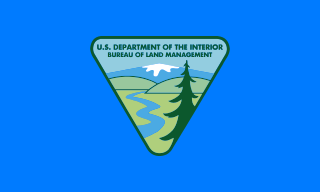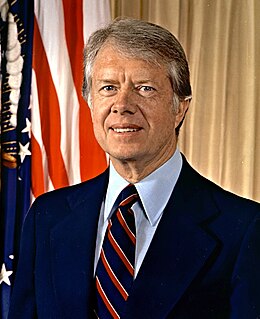
The Taiwan Relations Act is an act of the United States Congress. Since the recognition of the People's Republic of China, the Act has defined the officially substantial but non-diplomatic relations between the people of the United States and the people on Taiwan.
The Federal Power Act is a law appearing in Chapter 12 of Title 16 of the United States Code, entitled "Federal Regulation and Development of Power". Enacted as the Federal Water Power Act on June 10, 1920, and amended many times since, its original purpose was to more effectively coordinate the development of hydroelectric projects in the United States. Representative John J. Esch (R-Wisconsin) was the sponsor. Prior to this time and despite federal control of navigable waters and the necessary congressional approval to construct such facilities, Congress had left the regulation of hydroelectric power to the individual states. The first federal legislation broadly dealing with hydroelectric development regarded its competition with navigation usage; with the passage of the Rivers and Harbors Act of 1899 Congress made it illegal to dam navigable streams without a license from them. Until 1903, these congressional permits were given away on a 'first come first served' perpetual basis and controlled by the individual states. This would lead to a long debate between competing private and public development interests, and culminate in the act's passage in 1920.

The Ninety-fifth United States Congress was a meeting of the legislative branch of the United States federal government, composed of the United States Senate and the United States House of Representatives. It met in Washington, DC from January 3, 1977, to January 3, 1979, during the final weeks of the administration of U.S. President Gerald Ford and the first two years of the administration of U.S. President Jimmy Carter.

The National Energy Conservation Policy Act of 1978 is a United States statute which was enacted as part of the National Energy Act.

The Tax Reduction and Simplification Act of 1977 was passed by the 95th United States Congress and signed into law by President Jimmy Carter on May 23, 1977.

The Psychotropic Substances Act of 1978 amended the Comprehensive Drug Abuse Prevention and Control Act of 1970 and Controlled Substances Act to ensure compliance with the Convention on Psychotropic Substances. 21 U.S.C. § 801a notes, "It is the intent of the Congress that the amendments made by this Act, together with existing law, will enable the United States to meet all of its obligations under the Convention and that no further legislation will be necessary for that purpose." The Psychotropic Substances Act created mechanisms by which the U.S. Government would add substances to the Schedules of controlled substances as required by the Convention. It also established a framework for exercising the U.S.'s rights to influence drug scheduling at the international level. The Secretary of Health and Human Services was given the power to make scheduling recommendations that would be binding on the U.S. representative in discussions and negotiations related to drug scheduling proposals before the Commission on Narcotic Drugs.

New Jersey Pinelands National Reserve is a national reserve that encompasses the New Jersey Pine Barrens.

The Civil Service Reform Act of 1978, (CSRA), reformed the civil service of the United States federal government, partly in response to the Watergate scandal. The Act abolished the U.S. Civil Service Commission and distributed its functions primarily among three new agencies: the Office of Personnel Management (OPM), the Merit Systems Protection Board (MSPB), and the Federal Labor Relations Authority (FLRA).

TheFederal Mine Safety and Health Act of 1977 amended the Coal Mine Safety and Health Act of 1969. It can be found in the United States Code under Title 30, Mineral Lands and Mining, Chapter 22, Mine Safety and Health.

The Act to Prevent Pollution from Ships is a United States law that implements the provisions of MARPOL and the annexes to which the United States is a party. The most recent U.S. action concerning MARPOL occurred in April 2006, when the U.S. Senate approved Annex VI, which regulates air pollution. Following that approval, in March 2007, the House of Representatives approved legislation to implement the standards in Annex VI, through regulations to be promulgated by Environmental Protection Agency in consultation with the U.S. Coast Guard.

The Agricultural Adjustment Act of 1980 amended the Food and Agriculture Act of 1977, primarily to raise the target prices for wheat and corn.

The National Aquaculture Act of 1980 is intended to promote and support the development of private aquaculture and to ensure coordination among the various federal agencies that have aquaculture programs and policies. It provided for a national aquaculture policy, including a formal National Aquaculture Development Plan; established a Joint Subcommittee on Aquaculture on which officials of USDA, Commerce, the Interior, and nine other federal agencies sit; designated USDA as the lead agency for coordination; and authorized the National Aquaculture Information Center within the National Agricultural Library.

The United States Food and Agriculture Act of 1977 was an omnibus farm bill. The S. 275 legislation was passed by the 95th U.S. Congressional session and signed into law by the 39th President of the United States Jimmy Carter on September 29, 1977.

The Wild and Free-Roaming Horses and Burros Act of 1971 (WFRHBA), is an Act of Congress, signed into law by President Richard M. Nixon on December 18, 1971. The act covered the management, protection and study of "unbranded and unclaimed horses and burros on public lands in the United States."

The Lake Hill Administrative Site Affordable Housing Act is a U.S. public law that requires the Secretary of Agriculture to sell 40 acres of Forest Service land near Frisco, Colorado. Summit County, Colorado would use the land to build affordable housing. The law was introduced into the United States House of Representatives during the 113th United States Congress.

Agent Orange Act of 1991 establishes provisions for the National Academy of Sciences to analyze and summarize scientific evidence regarding presumptive military service exposure to defoliants, dioxins and herbicides, better known as Agent Orange, during the Vietnam War era. The United States Statute endorses an observation of human medical conditions directly related to non-Hodgkin lymphoma, soft-tissue sarcoma, chloracne, and consistent acneform diseases for military personnel who served in the overseas Vietnamese region. The Act of Congress ratifies a medical research compilation of voluntarily contributed blood and tissue samples provided by Vietnam-era veterans serving in Southeast Asia between 1961 and 1975.

The Mental Health Systems Act of 1980 (MHSA) was United States legislation signed by President Jimmy Carter which provided grants to community mental health centers. During the following Ronald Reagan administration, the United States Congress repealed most of the law. The MHSA was considered landmark legislation in mental health care policy.

Solar Photovoltaic Energy Research, Development, and Demonstration Act of 1978 is a United States statute authorizing the research and development of photovoltaic systems utilizing solar energy or sunlight as a source for electricity generation. The Act of Congress promotes energy conservation by the displacement of conventional energy systems dependent upon alternative fuel and fossil fuel resources.

Endangered American Wilderness Act is a Federal law, enacted in 1978, that established ten new designated Wilderness Areas in the National Forests of several Western states. Sponsored by Arizona Democrat Morris Udall, the law added approximately 400,000 thousand acres of wilderness in California, Utah, New Mexico, and Wyoming, to the National Wilderness Preservation System. Other sections of the law established three new Wilderness Areas in Oregon and added additional acreage to two existing areas, and ordered the creation of a committee to develop a management plan for 330,000 acres of public land along the Salmon River in Idaho known as the Gospel-Hump area.

Earthquake Hazards Reduction Act of 1977 is a statute formulating a national policy to diminish the perils of earthquakes in the United States. The Act of Congress is a declaration for an earthquake prediction system, national earthquake hazards reduction program, and seismological research studies. The United States public law authorizes States assistance through the provisions of the Disaster Relief Act of 1974.









